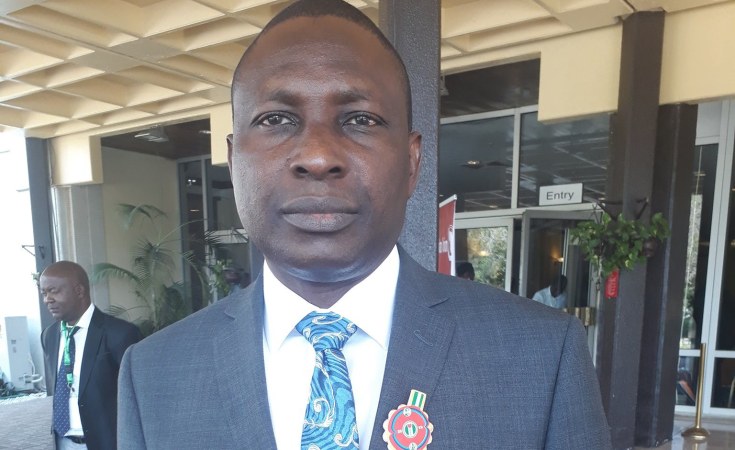History was yesterday recorded as President Bola Tinubu approved the appointment of Mr. Ola Olukoyede, the first Christian and southerner, to ever head the Economic and Financial Crimes Commission (EFCC) since the agency was set up in 2004.
His appointment, which was approved for a renewable term of four years in the first instance, pending the senate confirmation, however, followed the alleged resignation of his predecessor, Abdulrasheed Bawa, who had since been suspended by the president, and kept in detention.
The presidency would later justify the appointment of Olukoyede, saying he was more than qualified for the top position.
His appointment, according to a statement by the Media Adviser to the President, Ajuri Ngelale, was in line with the powers vested in Tinubu as established in section 2 (3) of the Economic and Financial Crimes Commission (Establishment) Act, 2004, that, "the Chairman and members of the Commission, other than ex-officio members, shall be appointed by the President."
Olukoyede, a lawyer with over 22 years of experience as a regulatory compliance consultant, is also specialist in fraud management and corporate intelligence.
He has extensive experience in the operations of the EFCC, having previously served as Chief of Staff to the Executive Chairman (2016-2018) and Secretary to the Commission (2018-2023).
"As such, he fulfils the statutory requirement for appointment as Chairman of the EFCC," the statement added.
The president has equally approved the appointment of Mr.Muhammad Hassan Hammajoda, to serve as the Secretary of the EFCC for a renewable term of five years in the first instance, pending Senate confirmation.
Hammajoda, a public administrator with requisite experience in public finance management, holds a Bachelor of Science degree in Accounting from the University of Maiduguri and a Master's degree in Business Administration from the same university.
He began his career as a lecturer at the Federal Polytechnic, Mubi. From there, he went into banking, including successful stints at the defunct Allied Bank and Standard Trust Bank.
Tinubu charged the new leadership of the EFCC to justify the confidence reposed in them in this important national assignment as a newly invigorated war on corruption undertaken through a reformed institutional architecture in the anti-corruption sector remains a central pillar of the President's Renewed Hope agenda.
Meanwhile, the presidency, yesterday, provided a list of seven facts about the new EFCC helmsman, which validated his appointment as Chairman of the Commission.
The unsigned list, titled: 'Quick facts on the legality of appointment of the new EFCC chairman', explained those grounds that qualified Olukoyede.
According to the presidency, "President Bola Tinubu approved his appointment in line with Section 2(3) of the Economic and Financial Crimes Commission (Establishment) Act, 2004.
"Mr Olukoyede was the Chief of Staff to the Executive Chairman of the EFCC (2016-2018) and Secretary to the Commission(2018-2020). He was a member of a law enforcement organisation as Secretary, in this case the EFCC, as stipulated in the EFCC Act, and as such satisfied every legal detail to be appointed as Chairman.
"Section 2(1)(p) of the EFCC Act plainly, ordinarily, and unambiguously established the Secretary to the Commission (i.e., EFCC) as its member and head of its administration.
"The Supreme Court determined in the case of Ejuetami v. Olaiya & Anor (2001) LPELR-1072 (SC) at Pg.23-24, that: The words used are to be given their 'ordinary and natural sense'.
"Therefore, the clear, explicit and unambiguous words used in sections 2(1)(a)(i)-(iii), (p), 2(2), 3(1)-(3) and 8(5) of the EFCC Act must be given their ordinary and natural sense in line with the guidelines set by the Supreme Court in its long line of undisturbed judicial precedents.
"The provision of Section 2(1) sub-paragraph (iii) of the EFCC Act did not state the nature of the experience which a person is required to possess its similar or alike for fifteen (15) years.
"This implies that such cognate experience is presumed to be that of the work or functions of the EFCC acquired anywhere since the EFCC Act did not state the specific place where it must be acquired. It is also unambiguous by the provisions of sub-paragraph (iii) that once a person possessed fifteen (15) years of such cognate (i.e., similar or alike) experience, then he has satisfied the provisions of sub-paragraph (iii) of section 2(1)(a) of the EFCC Act.
"It is clear from the unambiguous provisions of the EFCC Establishment Act, 2004, that any member of the Commission whether serving or retired, who has 15 years' cognate experience in their chosen career are eligible to be appointed as the Chairman of the Commission.
"Prior to this time, the convention and precedence, is that to be qualified for appointment as the Executive Chairman of the Commission, the nominee must be a Police Officer or someone with law enforcement background, particularly in the area of investigation.
"This has not only exposed the Commission to all manner of vices but has brewed internal wrangling, discontent, and hatred among the members of staff of the Commission.
"It is nonjusticiable to elevate convention above statutory provision. It is time to move away from fiction to fact and from convention to strict adherence to the statutory provisions of the enabling Act of the Commission in our constitutional democracy.
"Mr Olukoyede satisfied every legal requirement to be appointed as EFCC Chairman," the document stated.


